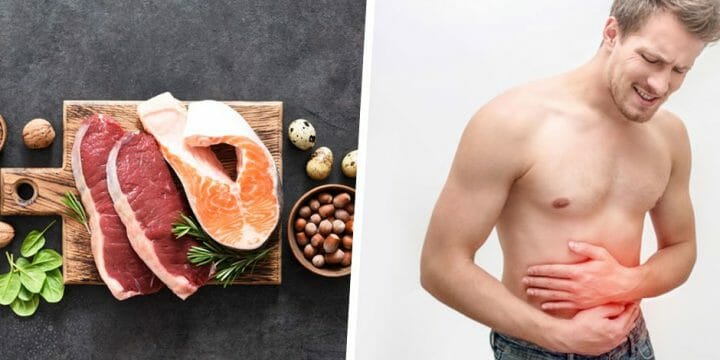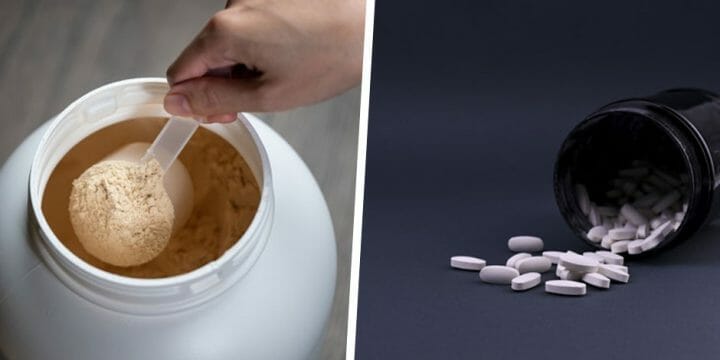Protein can help you achieve your fitness goals and keep you healthy.
But there’s a flip side to it. Excessive protein intake can actually damage your health.
So how can you find the right balance between too little and too much protein? We set out to discover just that.
We’ve partnered with a dietitian who shared two methods of calculating your ideal daily protein intake. You’ll find them both below, along with other crucial insights.
Quick Summary
- You should consume at least 0.36 grams of protein per pound of body weight for the body to get enough.
- A person should take more protein if they want to lose weight, want to build muscle mass, or if you are pregnant.
- Studies suggest that a diet with protein that makes up 30% of the total calorie intake for weight loss is optimal.
- In my opinion, balancing protein intake with a healthy diet and regular exercise is key to maximizing its benefits.
2 Methods To Calculate How Much Protein You Need

Daily protein needs vary based on weight and physical activity, ranging from 25 to 50 grams [1].
But you might need more or less depending on two factors:
- Your weight
- Your physical activity
In my experience, understanding how much protein you can absorb in one meal is crucial. I've found that spacing out protein consumption throughout the day, rather than in one large meal, helps with better absorption and muscle recovery.
This approach not only aids in muscle building but also plays a vital role in maintaining a robust immune system. Adequate protein intake is essential for a healthy immune response, a key aspect of overall health and disease prevention.
So, we’ll show you two methods to calculate your ideal daily protein intake based on both factors.
Ideal Protein Intake According To Your Weight
The National Institutes of Health mentions that a general rule says that you need 0.36 grams of protein per pound of body weight – or 0.8 grams per kilogram – if you’re an adult [2].
So, you can multiply how much you weigh by 0.36 or 0.8 to calculate how much protein you need daily. For example, an adult weighing 180 pounds should eat around 65 grams of protein daily: 180 pounds x 0.36 = 64.8.
But you must also consider how much protein you can absorb in one meal before planning your daily protein intake.
Ideal Protein Intake According To Your Physical Activity

You can also calculate your ideal intake of protein based on physical activity. First, calculate your lean body mass (LBM):
- Determine your body fat percentage. Use a BIA scale or DEXA scan to do so.
- Calculate total body fat in pounds. Multiply your body fat percentage by your body weight. For example, a person that weighs 170 pounds and has 25% fat has 43 pounds of fat (170 x 0.25 = 42.5).
- Calculate your LBM. Subtract body fat weight from the total weight. The person from our example has an LBM of 127 (170 - 43 = 127).
Now that you’ve calculated your LBM, you can multiply it by the amount of protein you should eat per pound based on how active you are [3]:
- Sedentary (generally inactive) = 0.5 g
- Light (practicing activities like walking and gardening) = 0.6 g
- Moderate (30 minutes of physical activity three times a week) = 0.7 g
- Active (60 minutes of exercise five times a week) = 0.8 g
- Very active (10-20 hours of exercise per week) = 0.9 g
- Athlete (20+ hours of exercise per week) = 1.0 g
Protein needs may differ greatly based on how active you are. For example, let’s assume that you have a lean mass of 127. You would need:
- 64g of protein per day if you’re sedentary
- 102g of protein per day if you’re active
- 127g of protein per day if you’re an athlete
When Do You Need More Protein?

Your weight and physical activity are important in determining your ideal intake of protein foods for muscle gain.
In most cases, you should stick to it religiously because too much protein may lead to health issues, such as kidney disease. But there are specific circumstances in which your body needs more protein.
In certain situations, like weight loss or muscle building, increasing protein intake is beneficial.
You Want To Lose Weight
Eating protein may burn fat by accelerating your metabolism and reducing your appetite.
Fast metabolism leads to faster burning of calories. So, you can actually eat more without putting on pounds. Also, protein will keep you feeling full and curb your cravings at the same time [4]. So, you might want to switch to a high-protein diet if you’re trying to shed a few pounds.
Some studies have shown that protein intake that makes up 30% of your total calorie intake is optimal for weight loss [5].
You can combine protein-rich foods with protein supplements for faster results. Just remember that some supplements may contain excess calories that could lead to weight gain in the long run.
Related: Do You Lose Muscle or Fat First?
You’re Building Muscle Mass

Protein is vital for muscle gain. In fact, muscles mainly consist of protein. And if you were struggling to build muscle until now, that’s probably because you didn’t consume enough protein.
Muscle protein is constantly being broken down and rebuilt. So, to gain muscle, your body needs to synthesize more protein than it breaks down [5].
To get maximum results, CheckMeowt founder and editor-in-chief Joseph Gregorio advised consuming one gram of protein per pound of body weight. He said that this is a good benchmark to follow when one is looking to build muscle mass.
Anything above this is typically overkill — as your body will take whatever protein it needs and excrete the rest as waste which could cause more harm than good in the long run.
You can help it do so by eating protein-rich foods or consuming protein supplements, such as whey protein powder.
Related: Is It Okay to Drink Whey Protein Everyday?
You’re Pregnant
During pregnancy, your body needs more protein to develop and grow tissue. According to one study, you should ingest 0.55 – 0.69 g of protein per pound, or 1.2 – 1.52 grams per kilogram [6].
To calculate your ideal protein intake, multiply your weight with the recommended dosage. For example, you should consume around 96 g of protein per day if you weigh 160 pounds and are halfway through your pregnancy (160 x 0.60 = 96).
You’ll Also Need More Protein If:
- You’re recovering from an injury: When you suffer an injury, your muscles may deteriorate because you can’t move the body parts that have been hurt. And since muscles mainly consist of protein, you should consume it more to prevent losing significant muscle mass.
- You’re older: Elderly adults should consume higher amounts of protein because they’re less responsive to amino acids. So, they need more amino acids to benefit from them. The ideal daily intake of protein for the elderly seems to be between 1.2 and 2.0 g per kilo of body weight [7].
Related Article: What Is The Best Protein Powder for Seniors?
What To Eat To Get More Protein

Increase protein intake through high-protein diets or supplements, but prioritize natural sources if not exercising regularly.
Here are four examples of such foods:
- Fish and seafood (e.g., fish, crabs, lobster, clams)
- Poultry (e.g., chicken breast, turkey)
- Eggs
- Dairy (milk, cheese, and yogurt)
If you switch to a higher-protein diet and still don’t meet your daily requirements, you can try adding a few protein shakes to your daily meal plan.
FAQs
How Does Physical Activity Affect My Protein Needs?
Your physical activity level significantly affects your protein needs because active muscles require more protein for repair and growth. If you exercise regularly, especially in strength training or endurance sports, your body needs more protein to repair muscle tissue and support muscle growth.
Are There Specific Situations Where I Might Need More Protein?
Yes, there are specific situations where you might need more protein. These include periods of weight loss, muscle building, pregnancy, injury recovery, and aging.
References:
- https://www.healthline.com/nutrition/whey-protein-101
- https://ods.od.nih.gov/HealthInformation/nutrientrecommendations.aspx
- https://www.verywellfit.com/how-to-calculate-how-much-protein-you-need-3955709
- https://www.ncbi.nlm.nih.gov/pmc/articles/PMC4258944/
- https://www.ncbi.nlm.nih.gov/pmc/articles/PMC2732256/
- https://www.ncbi.nlm.nih.gov/pmc/articles/PMC4942872/
- https://www.ncbi.nlm.nih.gov/pmc/articles/PMC4924200/
About The Author
You May Also Like






